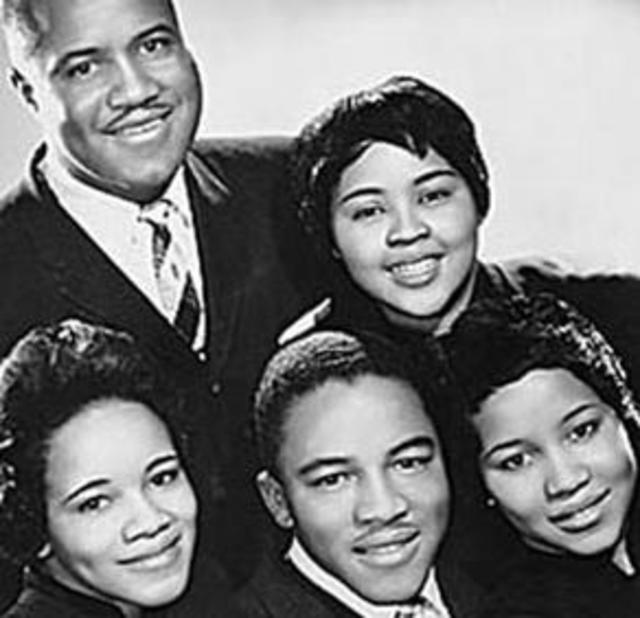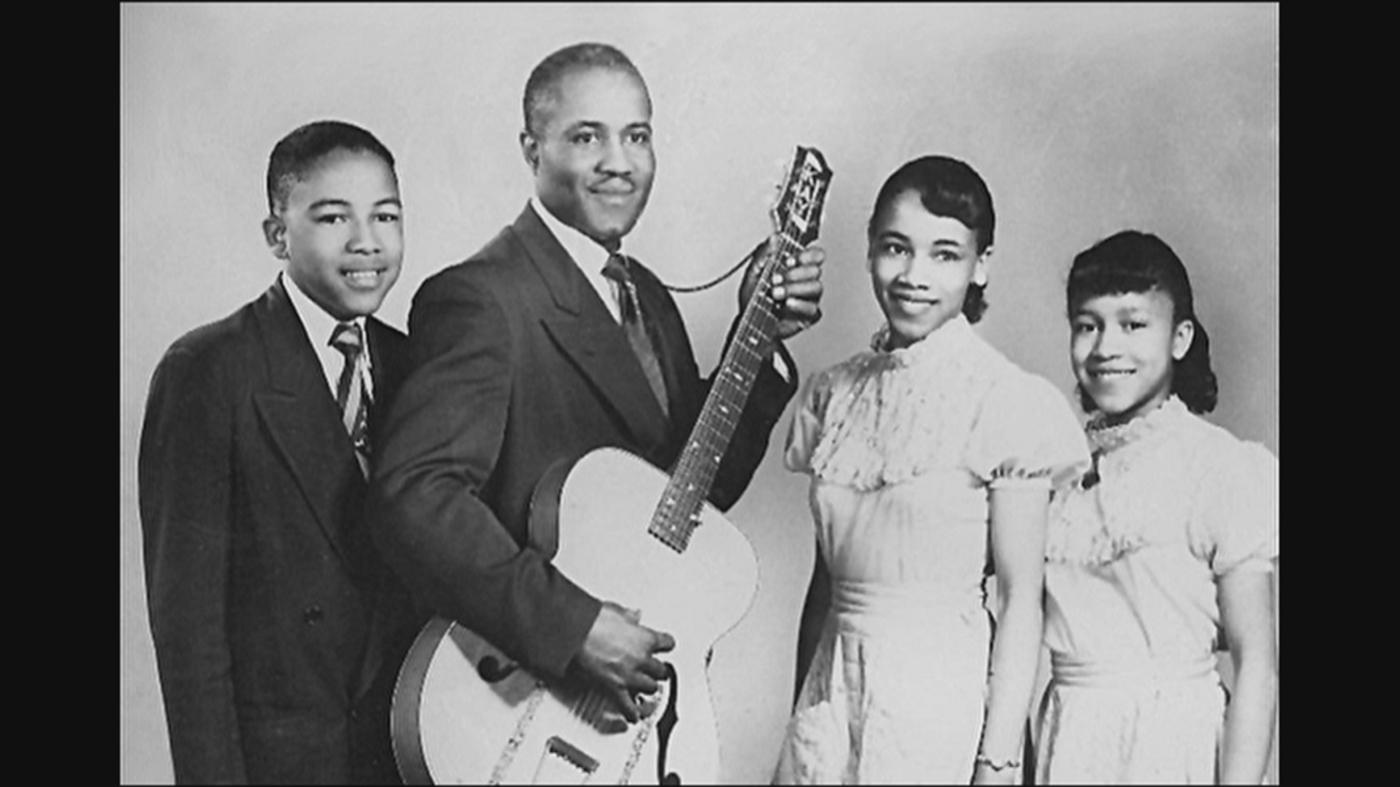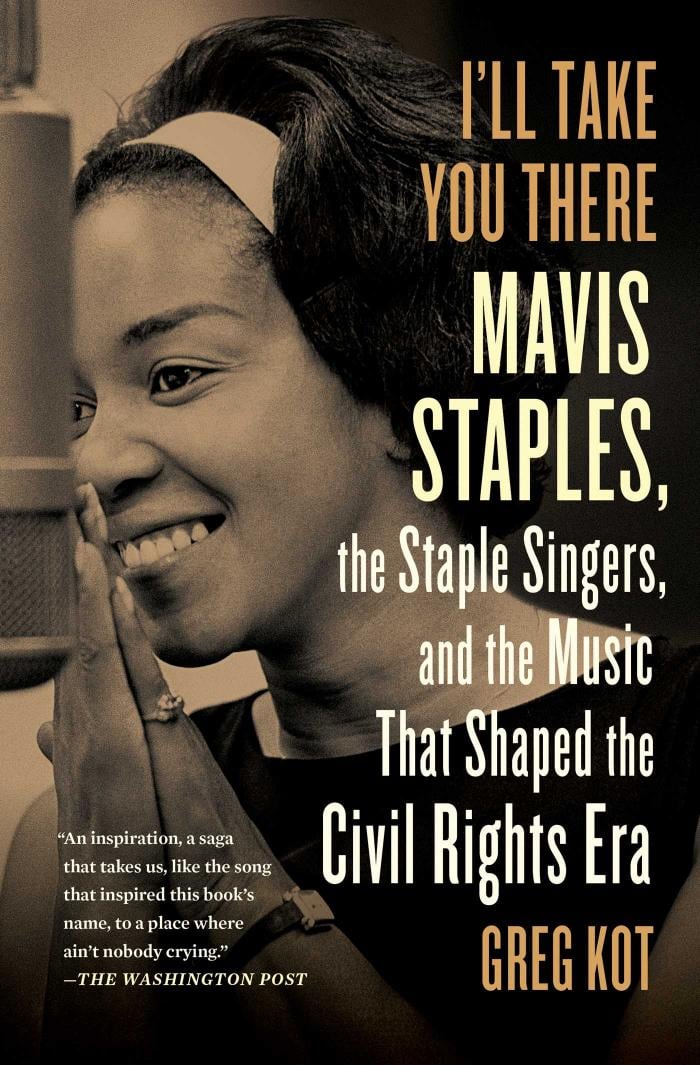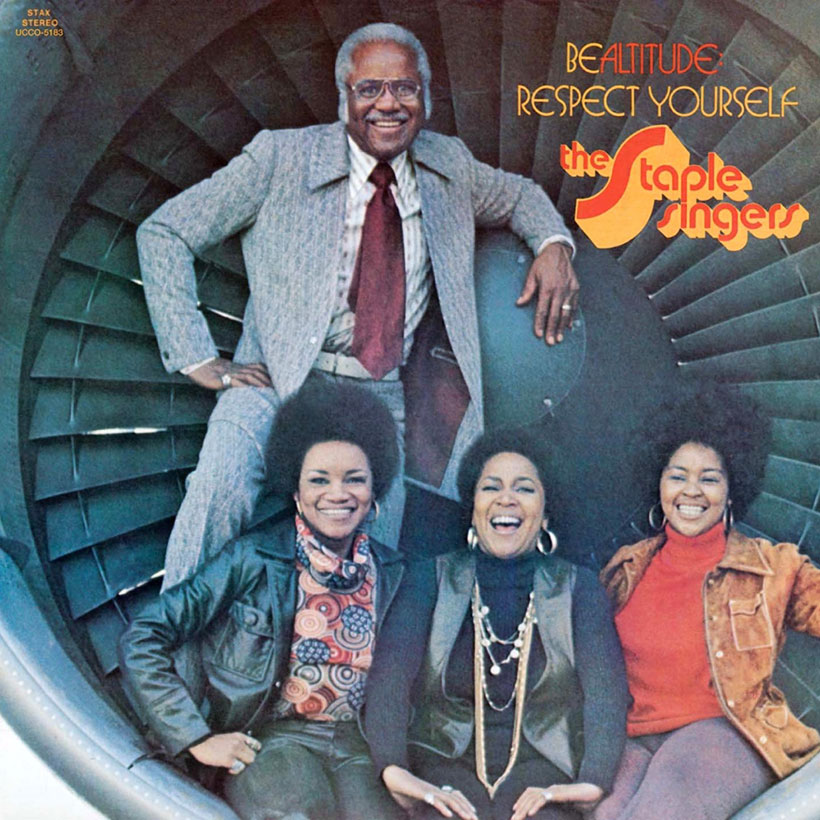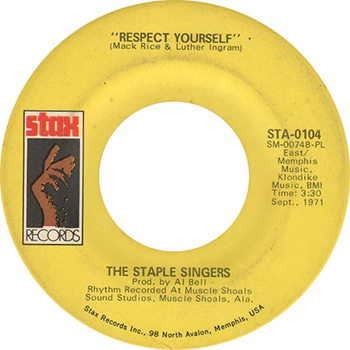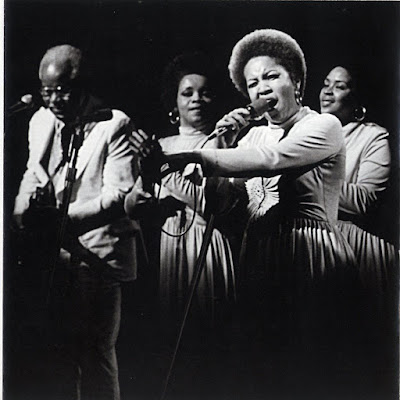SOUND PROJECTIONS
AN ONLINE QUARTERLY MUSIC MAGAZINE
EDITOR: KOFI NATAMBU
WINTER, 2019
VOLUME SIX NUMBER THREE
ANTHONY BRAXTON
Featuring the Musics and Aesthetic Visions of:
ISAAC HAYES
(December 29—January 4)
THOM BELL
(January 5-11)
THE O'JAYS
(January 12-18)
OTIS REDDING
(January 19-25)
BOOKER T. JONES
(January 26-February 1)
THE STYLISTICS
(February 2-8)
THE STAPLE SINGERS
(February 9-15)
OTIS RUSH
(February 16-22)
ERROLL GARNER
(February 23-March 1)
EARL HINES
(March 2-8)
BO DIDDLEY
(March 9–15)
BIG BILL BROONZY
(March 16–22)
https://www.allmusic.com/artist/the-staple-singers-mn0000577235/biography
The Staples recorded in an older, slightly archaic, deeply Southern spiritual style first for United and then for Vee-Jay. Pops and Mavis Staples shared lead vocal chores, with most records underpinned by Pops' heavily reverbed Mississippi cotton-patch guitar. In 1960 the Staples signed with Riverside, a label that specialized in jazz and folk. With Riverside and later Epic, the Staples attempted to move into the then-burgeoning white folk boom. Two Epic releases, "Why (Am I Treated So Bad)" and a cover of Stephen Stills' "For What It's Worth," briefly graced the pop charts in 1967.
https://www.allmusic.com/artist/the-staple-singers-mn0000577235/biography
The Staple Singers
(1948-1994)
Artist Biography by Rob Bowman
The Staples' story goes all the way back to 1915 in Winona, Mississippi, when patriarch Roebuck "Pops" Staples entered the world. A contemporary and familiar of Charley Patton's, Roebuck
quickly became adept as a solo blues guitarist, entertaining at local
dances and picnics. He was also drawn to the church, and by 1937 he was
singing and playing guitar with the Golden Trumpets, a spiritual group
based out of Drew, Mississippi. Moving to Chicago four years later, he
continued playing gospel music with the Windy City's Trumpet Jubilees. A
decade later Pops Staples (as he had become known) presented two of his daughters, Cleotha and Mavis, and his one son, Pervis, in front of a church audience, and the Staple Singers were born.
The Staples recorded in an older, slightly archaic, deeply Southern spiritual style first for United and then for Vee-Jay. Pops and Mavis Staples shared lead vocal chores, with most records underpinned by Pops' heavily reverbed Mississippi cotton-patch guitar. In 1960 the Staples signed with Riverside, a label that specialized in jazz and folk. With Riverside and later Epic, the Staples attempted to move into the then-burgeoning white folk boom. Two Epic releases, "Why (Am I Treated So Bad)" and a cover of Stephen Stills' "For What It's Worth," briefly graced the pop charts in 1967.
In 1968 the Staples signed with Memphis-based Stax. The first two albums, Soul Folk in Action and We'll Get Over, were produced by Steve Cropper and backed by Booker T. & the MG's. The Staples were now singing entirely contemporary "message" songs such as "Long Walk to D.C." and "When Will We Be Paid." In 1970 Pervis Staples left and was replaced by sister Yvonne Staples. Even more significantly, Al Bell took over production chores. Bell took them down the road to Muscle Shoals, and things got decidedly funky.
Starting with "Heavy Makes You Happy (Sha-Na-Boom Boom)" and "I'll Take You There," the Staples counted 12 chart hits at Stax. When Stax encountered financial problems, Curtis Mayfield signed the Staples to his Curtom label and produced a number one hit in "Let's Do It Again." The Staples
went on to continued chart success, albeit less spectacularly, with
Warner, through 1979. One more album followed on 20th Century Fox in
1981. After a three-year hiatus, they signed a two-album deal with
Private I and hit the R&B charts five more times, once with an
unlikely cover of Talking Heads' "Slippery People."
The Staple Singers found a new audience in 1994 when they teamed with Marty Stuart to perform "The Weight" on the Rhythm, Country & Blues LP for MCA. Sadly, Pops passed away on December 19, 2000, shortly after suffering a concussion due to a fall in his home. Cleotha died in February 2013 after a decade with Alzheimer's disease. Throughout the 2000s and early 2010s, Mavis released excellent solo material for the Alligator and Anti labels. In 2015, Concord released a four-disc Staples box set, Faith and Grace: A Family Journey 1953-1976. Yvonne Staples died of colon cancer at her home in Chicago in April 2018 at the age of 80.
https://www.staxrecords.com/pages/the-staple-singers
[August 2018 update: In addition to his duties at "The Late Show with Stephen Colbert," Jon Batiste has signed to Verve Records and will release his first solo album, Hollywood Africans, on September 28. The collection spans both Batiste's own original compositions and some standards too, like Louis Armstrong's "What a Wonderful World." And one of Batiste's favorite singers and human beings, Mavis Staples, will be a part of New York's AmericanaFest at Lincoln Center's Damrosch Park on August 11, along with Joe Henry. Both Batiste and Staples were at the 2018 Newport Folk Festival too, with Staples joining Mumford and Sons for their surprise set.]
Since "The Late Show with Stephen Colbert" debuted on CBS in September 2015, Jon Batiste, the show's charismatic music director, pianist and melodica master, and his group, Stay Human, have been an indelible part of America's television nightscape.
The multifaceted Batiste, who has also moonlighted as a comedian and actor when not playing effusive New Orleans-sparked jazz and rock, is an integral factor in the show's razor-sharp intelligence and sophisticated cool. But the young Kenner, Louisiana-raised, Juilliard-educated, New York-based musician had an impressive, illustrious career long before Colbert and the late night talk show circuit, releasing his first album, Times in New Orleans, at the precocious age of 17. He's collaborated with Prince, Wynton Marsalis and Questlove and is associate artistic director of Harlem's National Jazz Museum.
And like this week's FUV Essentials, Mavis Staples and the Staple Singers, Batiste hails from a very musical family, the Batiste Brothers Band (inspiring his character and others in HBO's "Treme"). Activism, altruism and human rights also play a significant role in the young artist's professional and personal life. He warmly defines his art as "social music" — as he explained on "The Colbert Report" back in 2014. "Music is really about a shared experience," said Batiste. "A genuine human exchange."
Not surprisingly, Mavis Staples and Batiste quickly found their way to each other — the pair have performed together and Batiste co-wrote the song "Tomorrow" with Aloe Blacc (who wrote about Stevie Wonder for FUV Essentials) for her 2016 album Livin' on a High Note. She discussed their collaboration with Colbert when a guest on the show in February 2016 (with Batiste joining in).
Jon Batiste: Five Essential Mavis and Pops Staples Songs:
Mavis has a way of making you feel good about life. When she says everything is gonna be okay, you really believe it. This recording has such a joyous aura to it and it transports you home, no matter where you're from. The wisdom in her voice is healing. Love it!
If an alien from another planet landed on earth and asked "what is music?" this record would in the top ten of what I'd use as an example. Here we witness what happens when a stellar song is performed by the perfect artist for it. No one could have sung this song better than Mavis. It's her soul personified.
For die-hard Mavis fans this is an obvious choice but for the novice I'd recommend this is a first listen. My dad would play this song for me when I was a kid and it's always been a part of the fabric of my childhood. It was also the first song that I performed with Mavis when we first met. This song obviously has a special place in my heart and is truly a timeless classic.
Jon Batiste
July 2017
THE STAPLE SINGERS
An interviewer once asked Roebuck “Pops” Staples, leader of the
world-famous Staple Singers, if they were originally from Chicago.
“Well,” Pop explained, “Cleo is originally from Mississippi, but I’m from Maine.”
The reporter seemed a bit puzzled.
“You didn’t know that, did you?” Pops added in his syrupy country drawl.
“No, I didn’t,” the perplexed writer answered.
“Yep. I’m from Maine-the main part of Mississippi,” Pops said as he burst into laughter.
Staples and his three singing daughters – Mavis, Yvonne, and Cleo-have come a long way from the main part of Mississippi. From their gospel beginnings through the folk-rock era to their soul music peak, the Staple Singers have traveled a long, artistically-rich road into the mainstream of American music.
Roebuck Staples was born in 1915 in Winona, Mississippi, where he grew up with hard times and the blues, his singing and guitar style influenced by country bluesmen Barbecue Bob and Big Bill Broonzy. But Roebuck found the Lord and joined a jubilee quartet called the Golden Trumpets.
Roebuck, his wife Oceola, and their two children, Cleotha and Pervis, moved north to Chicago in 1936, where Yvonne and Mavis were born a few years later.
Singing in a Southern quartet style usually performed by all-male, adult groups, the Staple Singers began appear-ing at local churches in 1948. Mavis, then age seven, handled the bass parts.
By 1954, Pops, Mavis, Cleo, and Pervis (Yvonne replaced him many years later) landed a contract with Chicago’s United label, cutting a num-ber called “Sit Down Servant.” Pop’s thin, winsome tenor shared the lead with Mavis’s deep, throaty tones, as they have done ever since, although her unique contralto had not developed the emotional edge it was soon to have. The record failed to catch on, though, per-haps because Pops’ reverberating down-home guitar, which would become an-other trademark of their style, was overshadowed by a rinky-tink piano.
The Staple sound did click in a big way when their haunting 1957 Vee-Jay recording of “Uncloudy Day” became a nationwide gospel hit. Others followed, including “Will the Circle Be Unbroken,” “Help Me, Jesus,” and “Swing Down Chariot (Let Me Ride”), established the Staples as one of America’s top gospel attractions.
They were signed to Bill Grauer and Orrin Keepnews’s Riverside jazz label in 1962 when the folk music boom was in full force. The group was beginning to pick up college bookings, in addition to their religious dates. While at Riverside, they were the first black artists to re-cord material by Bob Dylan.
Their following continued to expand when they moved to the Epic label, where they became identified with so-cial protest songs like “Freedom High-way” and “Why? (Am I Treated So Bad),” both penned by Pops, and Ste-phen Stills’s “For What It’s Worth.” (The latter two were produced by rock and roll legend Larry Williams.)
When the Staples joined Stax in 1968, they were working alongside major rock acts at places like the Fillmore West and East. The first two Stax albums, produced by Steve Cropper, continued in the folk vein, but their third, The Staple Swingers, offered a bold new direction of hip soul “mes-sage” songs. It was produced in Muscle Shoals, Alabama, by Al Bell, as was their next, Be Altitude: Respect Your-self.
Be Altitude broke the Staple Singers wide open. “Respect Yourself,” written by Mack Rice and Luther Ingram, reached the Number Two position on Billboard’s soul chart, while Al Bell’s “I’ll Take You There,” with its infec-tious reggae-like beat, hit Number One soul and pop.
There were more hits at Stax-“Oh La De Da,” “If You’re Ready (Come Go with Me),” and “Touch a Hand, Make a Friend”-before they moved on to Warner Bros., where they scored with Curtis Mayfield’s soundtrack to Let’s Do It Again.
Changing their name to “The Staples” and adopting a more secular image, the group cut albums produced by fellow Chicagoans Curtis Mayfield and Eugene Record.
Pops Staples died December 19, 2000.
https://www.rockhall.com/inductees/staple-singers
ROCK AND ROLL HALL OF FAME
Members:
The Staple Singers delivered music with a message.
The Staples’ evolved from gospel music to soulful pop, delivering hits in both genres. The family group’s music was a vehicle for social activism, positive change and love
“Well,” Pop explained, “Cleo is originally from Mississippi, but I’m from Maine.”
The reporter seemed a bit puzzled.
“You didn’t know that, did you?” Pops added in his syrupy country drawl.
“No, I didn’t,” the perplexed writer answered.
“Yep. I’m from Maine-the main part of Mississippi,” Pops said as he burst into laughter.
Staples and his three singing daughters – Mavis, Yvonne, and Cleo-have come a long way from the main part of Mississippi. From their gospel beginnings through the folk-rock era to their soul music peak, the Staple Singers have traveled a long, artistically-rich road into the mainstream of American music.
Roebuck Staples was born in 1915 in Winona, Mississippi, where he grew up with hard times and the blues, his singing and guitar style influenced by country bluesmen Barbecue Bob and Big Bill Broonzy. But Roebuck found the Lord and joined a jubilee quartet called the Golden Trumpets.
Roebuck, his wife Oceola, and their two children, Cleotha and Pervis, moved north to Chicago in 1936, where Yvonne and Mavis were born a few years later.
Singing in a Southern quartet style usually performed by all-male, adult groups, the Staple Singers began appear-ing at local churches in 1948. Mavis, then age seven, handled the bass parts.
By 1954, Pops, Mavis, Cleo, and Pervis (Yvonne replaced him many years later) landed a contract with Chicago’s United label, cutting a num-ber called “Sit Down Servant.” Pop’s thin, winsome tenor shared the lead with Mavis’s deep, throaty tones, as they have done ever since, although her unique contralto had not developed the emotional edge it was soon to have. The record failed to catch on, though, per-haps because Pops’ reverberating down-home guitar, which would become an-other trademark of their style, was overshadowed by a rinky-tink piano.
The Staple sound did click in a big way when their haunting 1957 Vee-Jay recording of “Uncloudy Day” became a nationwide gospel hit. Others followed, including “Will the Circle Be Unbroken,” “Help Me, Jesus,” and “Swing Down Chariot (Let Me Ride”), established the Staples as one of America’s top gospel attractions.
They were signed to Bill Grauer and Orrin Keepnews’s Riverside jazz label in 1962 when the folk music boom was in full force. The group was beginning to pick up college bookings, in addition to their religious dates. While at Riverside, they were the first black artists to re-cord material by Bob Dylan.
Their following continued to expand when they moved to the Epic label, where they became identified with so-cial protest songs like “Freedom High-way” and “Why? (Am I Treated So Bad),” both penned by Pops, and Ste-phen Stills’s “For What It’s Worth.” (The latter two were produced by rock and roll legend Larry Williams.)
When the Staples joined Stax in 1968, they were working alongside major rock acts at places like the Fillmore West and East. The first two Stax albums, produced by Steve Cropper, continued in the folk vein, but their third, The Staple Swingers, offered a bold new direction of hip soul “mes-sage” songs. It was produced in Muscle Shoals, Alabama, by Al Bell, as was their next, Be Altitude: Respect Your-self.
Be Altitude broke the Staple Singers wide open. “Respect Yourself,” written by Mack Rice and Luther Ingram, reached the Number Two position on Billboard’s soul chart, while Al Bell’s “I’ll Take You There,” with its infec-tious reggae-like beat, hit Number One soul and pop.
There were more hits at Stax-“Oh La De Da,” “If You’re Ready (Come Go with Me),” and “Touch a Hand, Make a Friend”-before they moved on to Warner Bros., where they scored with Curtis Mayfield’s soundtrack to Let’s Do It Again.
Changing their name to “The Staples” and adopting a more secular image, the group cut albums produced by fellow Chicagoans Curtis Mayfield and Eugene Record.
Pops Staples died December 19, 2000.
https://www.rockhall.com/inductees/staple-singers
ROCK AND ROLL HALL OF FAME
Courtesy of the Rock Hall Library and Archive
The Staple Singers
INDUCTED: 1999
Category: Performers
Members:
- Roebuck Staples
- Cleotha Staples
- Mavis Staples
- Pervis Staples
- Yvonne Staples
The Staple Singers delivered music with a message.
The Staples’ evolved from gospel music to soulful pop, delivering hits in both genres. The family group’s music was a vehicle for social activism, positive change and love
Biography
Jon Batiste: Five Essential Mavis and Pops Staples Songs
Jon Batiste (photo by Sasha Israel, PR
7.20.17
WFUV.org
WFUV.org
[August 2018 update: In addition to his duties at "The Late Show with Stephen Colbert," Jon Batiste has signed to Verve Records and will release his first solo album, Hollywood Africans, on September 28. The collection spans both Batiste's own original compositions and some standards too, like Louis Armstrong's "What a Wonderful World." And one of Batiste's favorite singers and human beings, Mavis Staples, will be a part of New York's AmericanaFest at Lincoln Center's Damrosch Park on August 11, along with Joe Henry. Both Batiste and Staples were at the 2018 Newport Folk Festival too, with Staples joining Mumford and Sons for their surprise set.]
Since "The Late Show with Stephen Colbert" debuted on CBS in September 2015, Jon Batiste, the show's charismatic music director, pianist and melodica master, and his group, Stay Human, have been an indelible part of America's television nightscape.
The multifaceted Batiste, who has also moonlighted as a comedian and actor when not playing effusive New Orleans-sparked jazz and rock, is an integral factor in the show's razor-sharp intelligence and sophisticated cool. But the young Kenner, Louisiana-raised, Juilliard-educated, New York-based musician had an impressive, illustrious career long before Colbert and the late night talk show circuit, releasing his first album, Times in New Orleans, at the precocious age of 17. He's collaborated with Prince, Wynton Marsalis and Questlove and is associate artistic director of Harlem's National Jazz Museum.
And like this week's FUV Essentials, Mavis Staples and the Staple Singers, Batiste hails from a very musical family, the Batiste Brothers Band (inspiring his character and others in HBO's "Treme"). Activism, altruism and human rights also play a significant role in the young artist's professional and personal life. He warmly defines his art as "social music" — as he explained on "The Colbert Report" back in 2014. "Music is really about a shared experience," said Batiste. "A genuine human exchange."
Not surprisingly, Mavis Staples and Batiste quickly found their way to each other — the pair have performed together and Batiste co-wrote the song "Tomorrow" with Aloe Blacc (who wrote about Stevie Wonder for FUV Essentials) for her 2016 album Livin' on a High Note. She discussed their collaboration with Colbert when a guest on the show in February 2016 (with Batiste joining in).
Batiste kindly took time from his demanding schedule to write about Mavis, Pops and the Staple Singers for FUV Essentials — and it's a Batiste-style "love riot" of admiration, enthusiasm and inspiration.
Jon Batiste: Five Essential Mavis and Pops Staples Songs:
Her
voice is always so honest. This single is from early in her career as a
solo artist and displays her ability to tell a story with an uncanny
depth of feeling. The redemption in her voice is palpable. I also love
how tight and compact the arrangement is. A must listen for true Mavis
fans.
This
recording transports me to another time and place. This is a posthumous
release and has a supernatural quality to it. It's trancelike and makes
one consider repentance.
Mavis has a way of making you feel good about life. When she says everything is gonna be okay, you really believe it. This recording has such a joyous aura to it and it transports you home, no matter where you're from. The wisdom in her voice is healing. Love it!
Mavis
and her family are truly sanctified, anointed by God to sing and uplift
souls. Put this record on and have an instant revival. The power and
love that is present in this recording is so moving that it makes me
cry. You can almost hear the pews shaking. This was movement music.
Revolution music.
If an alien from another planet landed on earth and asked "what is music?" this record would in the top ten of what I'd use as an example. Here we witness what happens when a stellar song is performed by the perfect artist for it. No one could have sung this song better than Mavis. It's her soul personified.
For die-hard Mavis fans this is an obvious choice but for the novice I'd recommend this is a first listen. My dad would play this song for me when I was a kid and it's always been a part of the fabric of my childhood. It was also the first song that I performed with Mavis when we first met. This song obviously has a special place in my heart and is truly a timeless classic.
Jon Batiste
July 2017
Mavis Staples
Mavis Staples (illustration by Andy Friedman)
7.17.17
WFUV.org
WFUV.org
How did Mavis Staples become a rock star?
There are quite a few examples of women who first found their voice in the church. Gospel roots were behind the rightfully celebrated pipes of Aretha Franklin, Whitney Houston, Mary J. Blige, Katy Perry, Faith Hill. These women made their mark at the top of the charts for pop, R&B, soul and country.
But a list of Mavis Staples’ fans and peers falls solidly in the rock world. Just over the past few years, her collaborators included Arcade Fire, Gorillaz, M. Ward, Son Little, and her producer and friend Jeff Tweedy of Wilco. These are rock stars who challenge assumptions, make some cacophonous noise, and generally shake things up. They’re not in the studio making things pretty, auto-tuning vocals, and reaching hard for mainstream airplay.
Staples shakes things up. She got it from her Dad, Roebuck "Pops" Staples, who raised his talented children to stand up for what is right. They started in the gospel tradition, but by the mid-’60s were civil rights activists in their own right, marching with Dr. Martin Luther King, Jr. and performing contemporary music to inspire the movement (“For What It’s Worth”).
As the Staple Singers — Pops, Mavis, and her siblings Cleotha, Yvonne, and Pervis — the family had hits through the mid-’70s on Stax Records, with Booker T. and the MGs as the studio band. They played with progressive artists like Bob Dylan (who famously asked Pops for Mavis’ hand in marriage), which then led them to appear in the Band’s epic 1976-78 concert film, "The Last Waltz." Their performance of “The Weight” is ingrained in the minds of millions.
As a solo artist, Mavis Staples' career has included working with producers Prince and Ry Cooder (“Down in Mississippi”) as well as Tweedy, winning the ears and hearts of a few generations along the way. Never one to sit still, her presence has lit up benefit concerts and collaborative albums on a regular basis, her growly alto unmistakeable in the mix, even amid the guitars and percussion of her rock star friends.
So why do these artists want to work with Staples? She was there at the start of popular music carrying a progressive message, her voice has carried significance. Of course the respect is unbounded. But it’s her big heart and her sharp mind that begs for a personal, creative connection. She has a lot to say, and with these compatriots, her message reaches far and wide.
A perfect example is her 2016 album, Livin' on a High Note. Produced by M. Ward, the album features songs written specifically for Staples by Nick Cave, Valerie June, Justin Vernon, tUnE-yArds, Neko Case, Ben Harper and other fans. It is full of joy, hope and a collective spirit. (Full album stream video below.)
It took until age 72 for Staples to nab her first Grammy award: Best Americana Album for You Are Not Alone. ("This has been a long time coming," she said at the time. No kidding.) And if you’re looking for some extra inspiration to wake up your own activist spirit, find the 2015 documentary Mavis! and see how that moves you.
The love at FUV for Staples is strong, and she kindly reciprocates. She joined us — along with the Head and the Heart, Josh Ritter and Dawes — for 2011’s Holiday Cheer benefit concert. In 2014 she was WFUV's "Artist of the Year," receiving our Sound & Vision award and performing at our annual gala.
Always a welcome guest in our Studio A, we look forward to her next journey (rumor has it she’s working with Jeff Tweedy again). In the meantime, celebrate with us the voice, the love, and the spirit of FUV Essentials artist Mavis Staples.
More:
https://www.npr.org/sections/therecord/2018/04/11/601494912/yvonne-staples-of-the-renowned-staple-singers-dead-at-80








